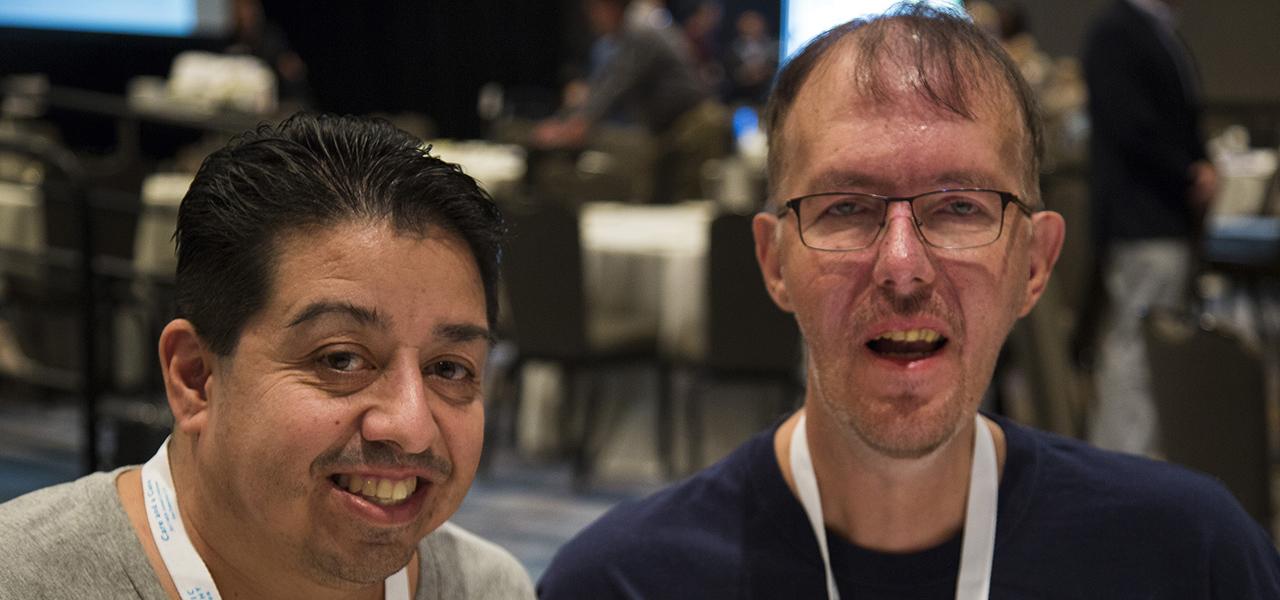A new review article assesses the current status of and recommends future directions for brain imaging studies in DM1.
Care Tools Articles
Given the brain manifestations of DM1, how aware are most patients of the impact and progression of their disease?
Investigators at the University of California San Diego, the University of Florida, and the National University of Singapore have recently reported early research that potentially ‘repurposes’ gene editing technology for a set of RNA disorders—myotonic dystrophy type 1 (DM1), myotonic dystrophy type 2 (DM2), a subset of Lou Gehrig’s disease (ALS) patients and Huntington’s disease.
Although fatigue represents a substantial burden in DM1, tools must be validated to assess its diverse contributing factors in order to develop clinical trial endpoints and effective therapies.
MDF staff recently attended the 2017 annual meeting of the American Academy of Neurology, in Boston, MA. Here are highlights from that meeting.
Sleep studies are indicated for DM1 patients with disrupted sleep or daytime sleepiness in order to direct selection of the optimal treatment regimen.
Longitudinal assessment of cognitive function in adult- and late-onset DM1 reveals a pattern of cognitive decline that can be modeled as an early-onset and acceleration of normal aging.
Dr. Gallais and his team are conducting a longitudinal study of cognition and central nervous system involvement in DM1. Read an interview with Dr. Gallais on this work here.Highlights from IDMC-10
Dr. Charles Thornton, neurologist at the University of Rochester Medical Center and MDF Scientific Advisory Committee member, has been awarded a Javits Neuroscience Investigator Award from the National Institutes of Health to further his research on muscular dystrophy. Read more about this very distinguished award for “exceptional” investigators and the important work Dr. Thornton is doing here.
MDF has awarded a 2016-2017 postdoctoral fellowship to Dr. Ian DeVolder at the University of Iowa to study CNS-related impacts of DM1.
Dr. Tetsuo Ashizawa, MD, has focused his career on the search for DM treatments and care for those affected. His multi-disciplinary, patient-centric approach to care moves DM research out of the lab and into his clinic at the University of Florida.
A recently published study from Sweden reported impaired facial recognition in people with DM1 and indicated that there are brain differences that affect how faces are perceived and stored by people with DM1.
Interesting Findings Reported in Recent DM Research Studies on Sleep Disturbances
Dr. Danielle Sheypuk, a licensed psychologist in New York, NY, was the presenter for our most recent webinar—the last for 2013— titled “Coping with Depression Associated with Having a Chronic Health Condition.”
Maurice Swanson, Ph.D., Professor of Molecular Genetics and Microbiology at University of Florida, Gainesville, and a team of researchers have found that the muscleblind-like 2 (MBNL2) protein in the central nervous system (CNS) may be responsible for the neurological impacts of myotonic dystrophy
Methylphenidate, a psycho-stimulant drug, also known by its 1948 trademarked name of Ritalin, could be useful in the treatment of excessive daytime sleepiness (EDS) for DM1 patients, according to a recent study conducted by The Department of Human Genetics at the Centre Hospitalier Universitaire de Quebec in Quebec City, Canada.

